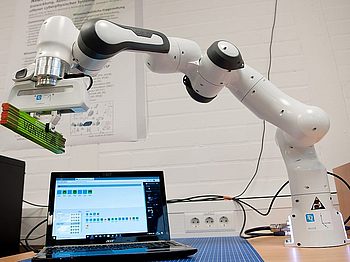KEIKO
(since 2022): Collaborative robots (cobots) can perform repetitive and well-defined tasks safely and with high speed and accuracy. Humans, on the other hand, are characterized by a higher degree of flexibility and the ability to improvise, by social intelligence and comprehensive cognitive abilities - properties that are not yet present in cobots.
On the one hand, a combination of these different and complementary strengths promises the considerable potential for use in central fields of application such as industrial production, healthcare, and care, as well as assistance systems for different systems and vehicles. On the other hand, this combination requires the robot to have an extremely high level of sociocognitive and emotional intelligence; without this, flexible collaboration in complex environments and with changing human partners is impossible. Empathic intelligence is understood as the fundamental ability to understand the partner's mental states and intentions and to react to them adaptively in a context-related manner. The lack of empathic intelligence in current cobots is the main reason for the still low use of flexible collaborative human-machine teams (MMT) in practice. Even the simplest application – the sensitive, situational handover of an object, e.g. a workpiece, requires robot performance that is currently unachievable. What humans can intuitively master poses problems for the machine: For example, it has to assess whether the human partner is actually willing to take over the object ("Take-Over-Readiness", TOR) and react accordingly and adjust its task planning according to the situation. The reasons for these difficulties are manifold. There is a lack of suitable data and sensors to make relevant status measurements (e.g. distracted, interested, or attentive).
The first represents the most fundamental research gap: In practice, any measurement of humans, however, designed, must always be passive and contactless or at least – about human activities – minimally invasive in order not to interfere with, for example, a production process or recycling process. Sensor technology, which collects data on the emotional state of people from physiological measurements (brain activity, breathing, pulse, etc.), has so far led to unacceptable restrictions on work activities due to cables, complex structures, and susceptibility to interference. Future measurements in use must not have this restriction. Artificial empathic intelligence (KEI) for robots is also the subject of the latest research. Results are urgently needed here.
The resulting danger is obvious; it can only be countered by considering situational-empathic information. These problems also occur in production and lead to conflicts or dangers. Accordingly, methods need to be researched that enable cobots to work hand in hand with humans without conflict and risk.
Cobots, therefore, represent an important future version for the digitization of industry. However, cooperation between humans and robots can only function at the level of real human-human collaboration if cobots, similar to us, have empathic intelligence. A wide-ranging and innovative problem that, as in the Clausthal and Göttingen joint project "Kognitiv und Empathisch Intelligente Kollaborierende Roboter" - KEIKO, requires an interdisciplinary effort from different research areas in the connection of software and hardware research with psychology and modeling.
The KEIKO funding project arose from research results from the preliminary project Heterogene Mensch-Machine Teams (HerMes) financed by the Clausthal University of Technology. The connection between man and machine to form a joint, cooperative team, in which the robot adapts to the human instead of the human adapting to the robot - human-centredness in the true sense of the word has been and is being investigated.
In six different sub-projects, trust estimation and building between humans and cobots, prediction of human movement trajectories, adaptation, and optimization of cobot movements, human behavior patterns, the acquisition of physiological and psychological parameters, and data fusion are researched.
With data-driven modeling of human behavior and the machine prediction of human action intentions and movement trajectories, predictions for the control of a cobot are to be made. On the other hand, emotion-based parameters are derived from neuropsychological investigations, the contactless measurement of which in combination with wearables, and wireless sensors worn on the body, is intended to create the database that makes emotionally sensitive cobots possible.
The exploration of emotion, cognition, and behavior and how these can be modulated by environmental conditions and individual differences, also considering social aspects; Recognizing mistakes in action due to incorrect mutual intention and movement predictions, and avoiding or mitigating mistakes without conflict are the goals of collaborative research. The findings are to be demonstrated on a cobot, which at the end of the project should be able to carry out a simple (dis)assembly task hand-in-hand with a human.
The project is funded as part of the SPRUNG program with over 1.7 million euros by the Lower Saxony Ministry of Science and Culture. From January 1, 2023, KEIKO will be centrally coordinated at the Simulationswissenschaftlichen Zentrum (SWZ) Göttingen-Clausthal and implemented on the demonstrator.
Project partners are Prof. Dr. Annekatrin Schacht and Prof. Dr. Florentin Wörgötter from the University of Göttingen and Prof. Dr. Jörg Müller, Prof. Dr. Andreas Reinhardt and Prof. Dr. Christian Rembe from the Clausthal University of Technology. In addition, Prof. Dr. Michael Prilla, who moved from the TU Clausthal to the University of Duisburg-Essen in 2022, is involved in the project.

